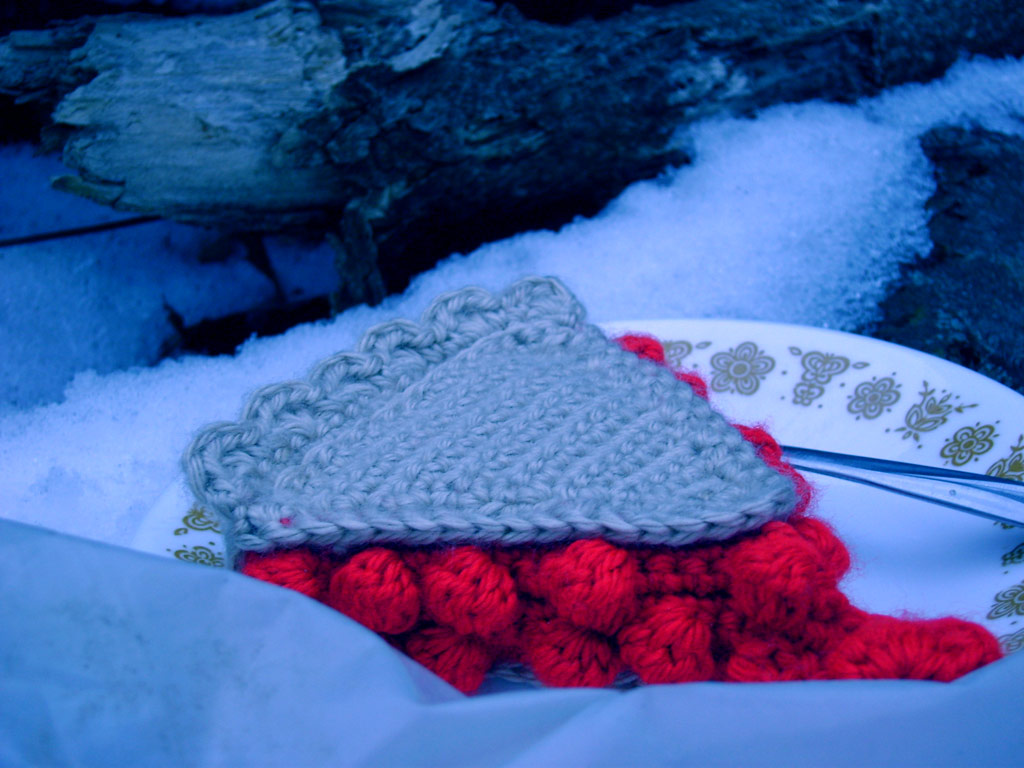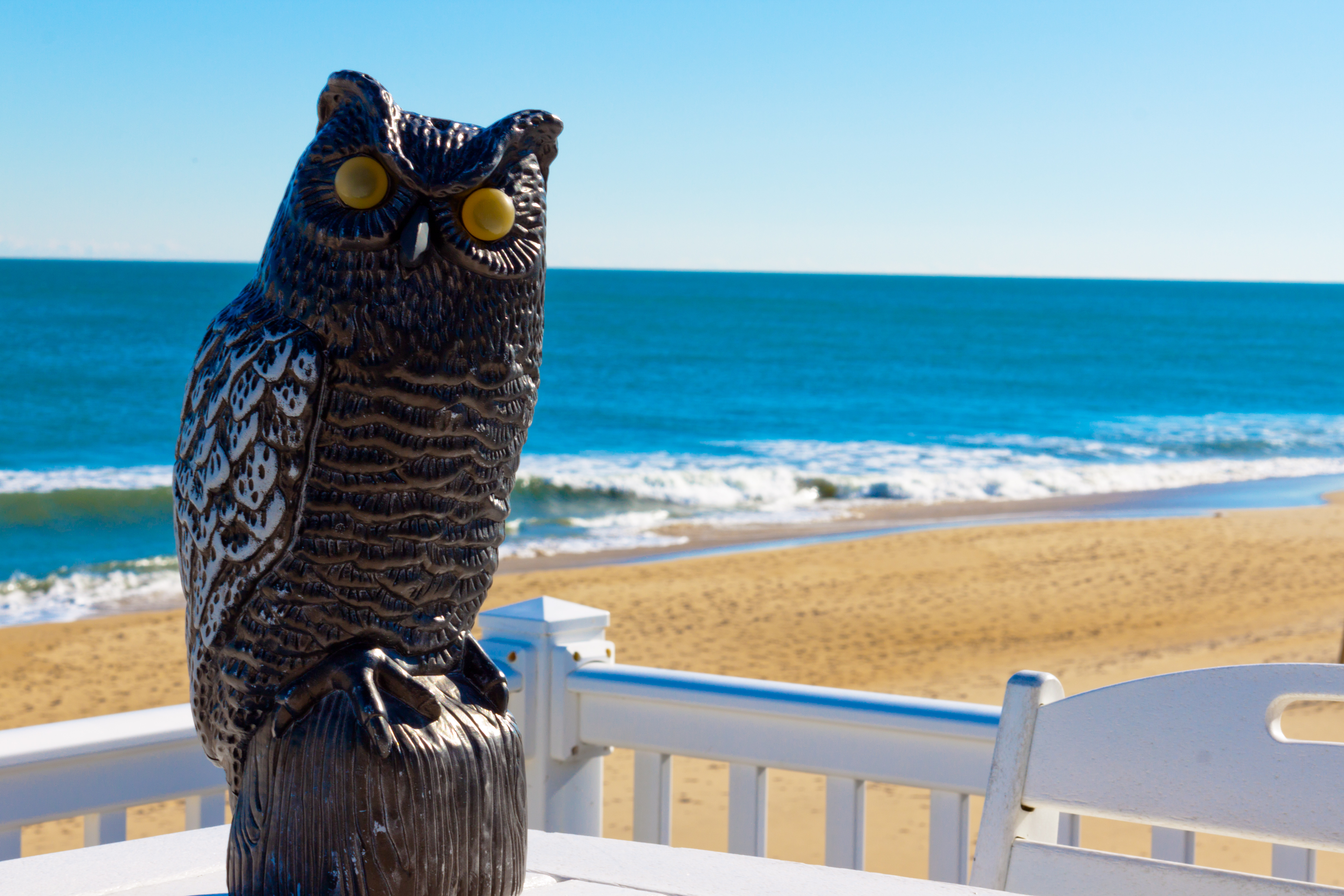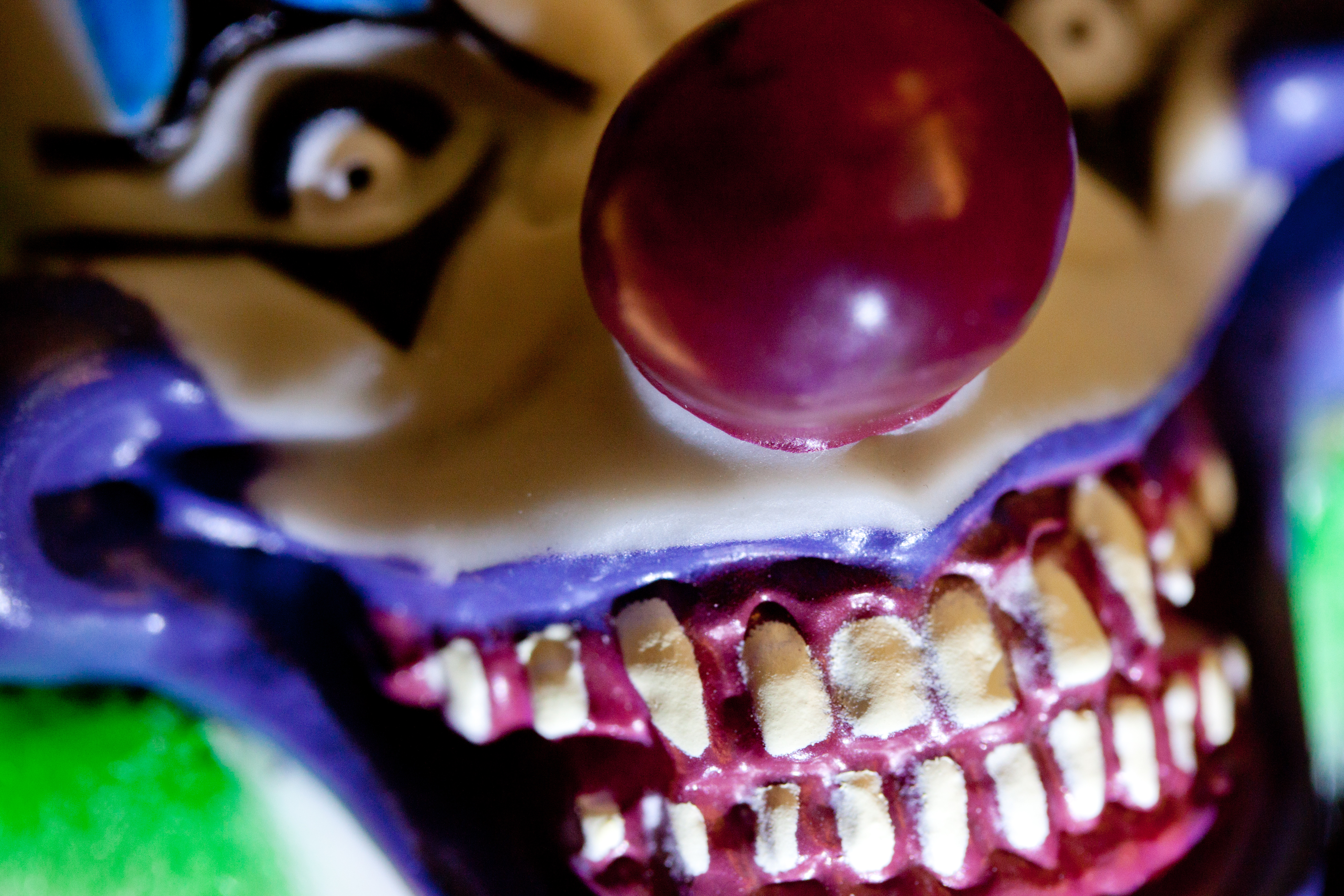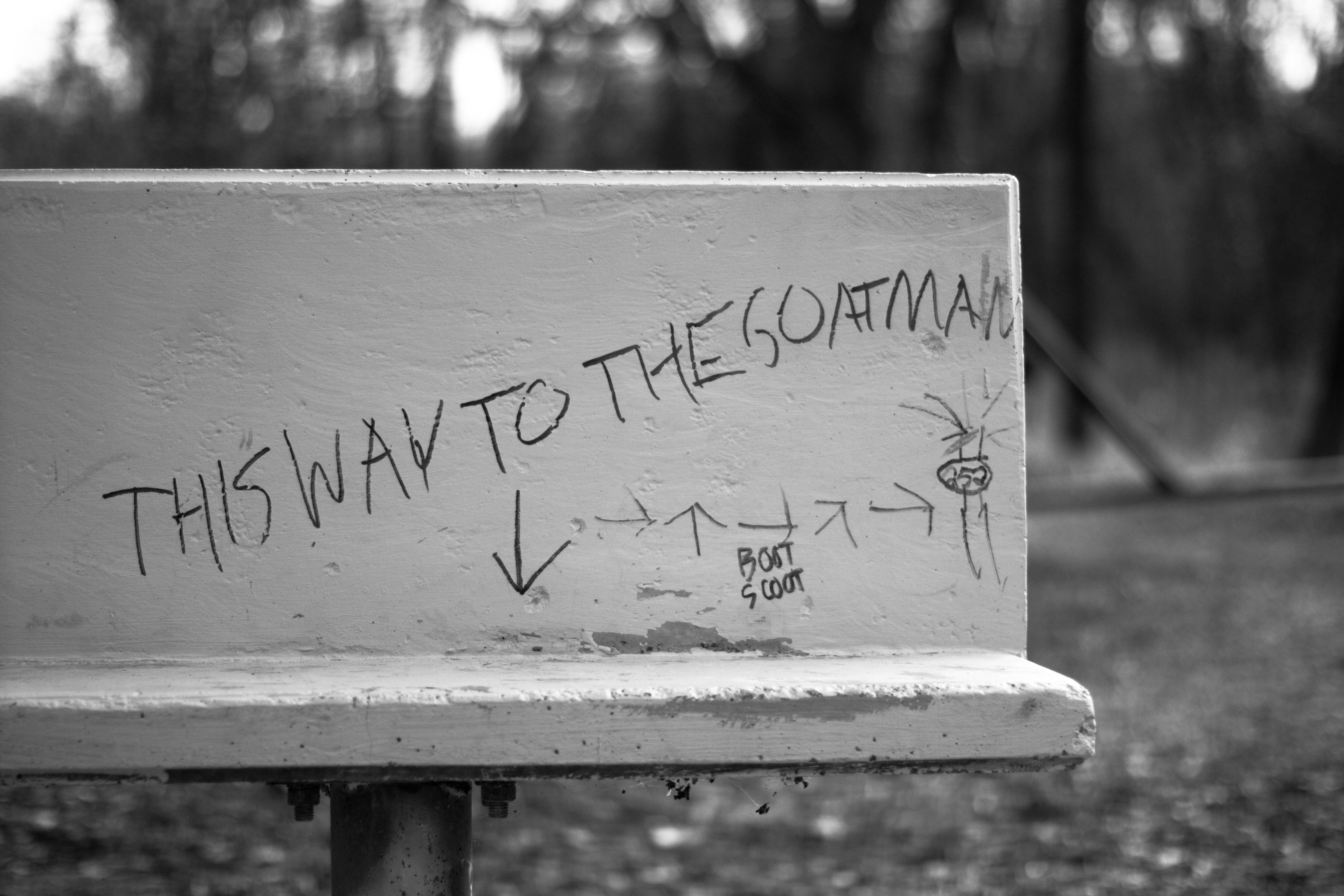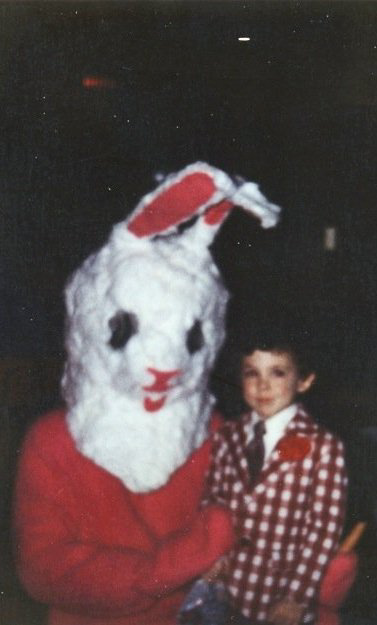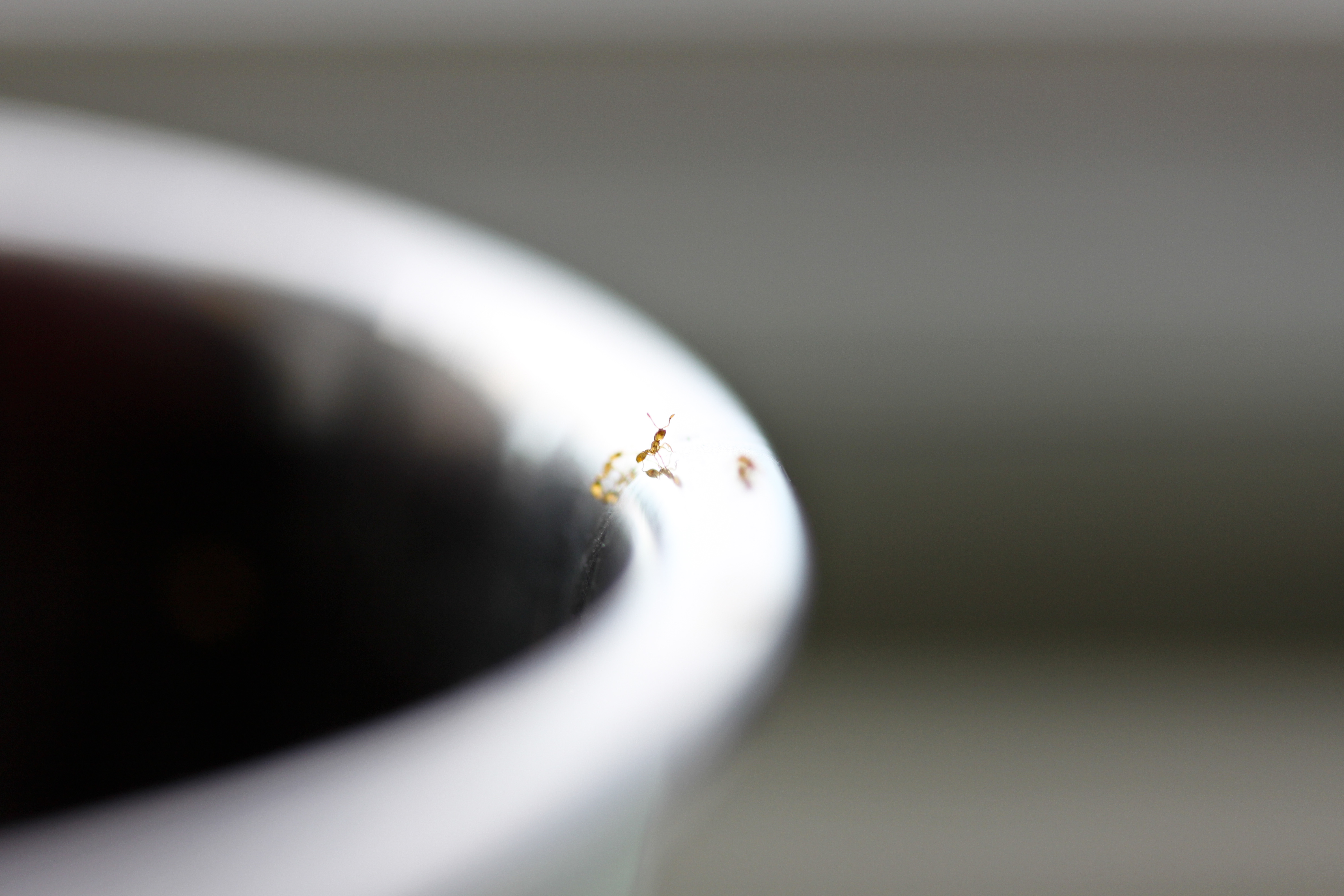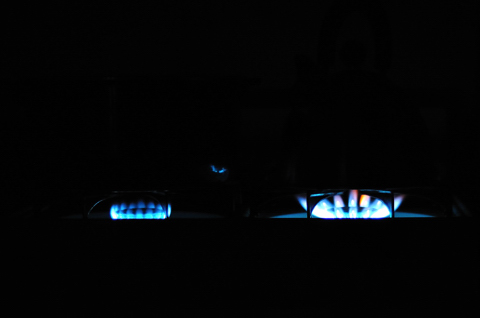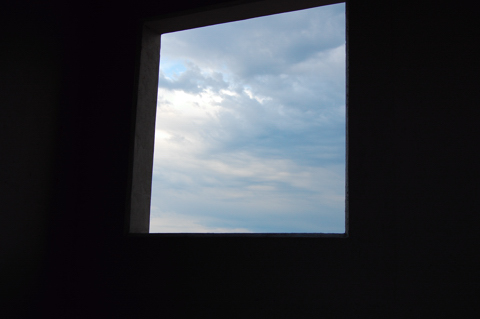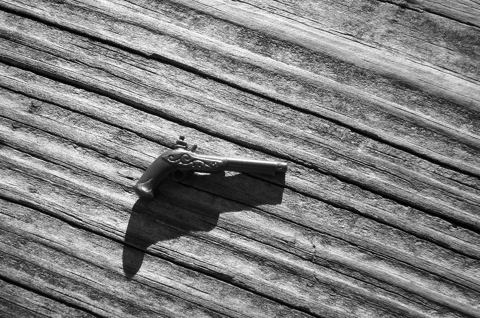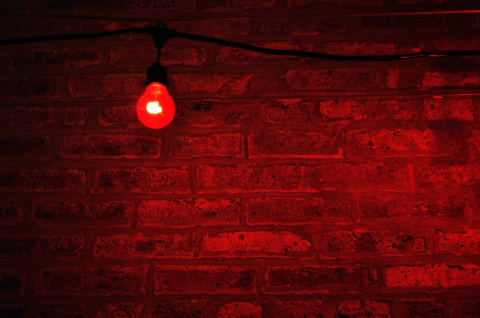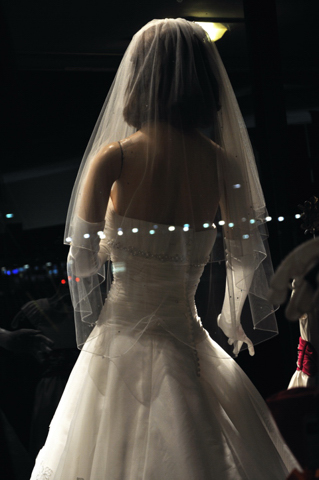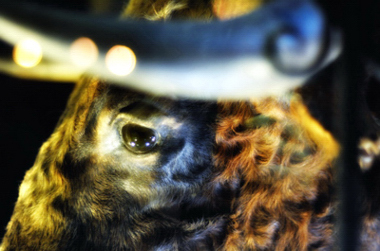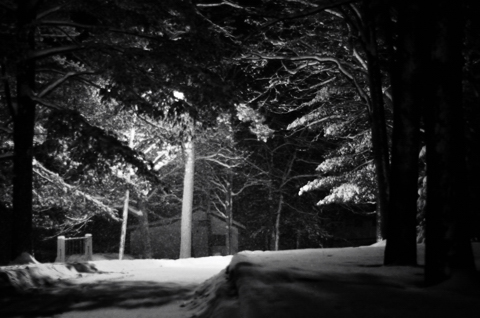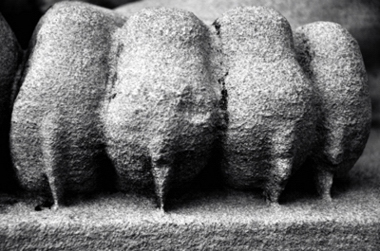on the theme of secret life
SKYCLAD
He started with her eyes by accident, the first thing he imagined about her. They appeared alone just off his patio, steaming in the night air. Irises like ripe olives. The eyes jerked from side to side, as terrified as he was. She must have been in pain, her eyes naked and disembodied like that. They disappeared when he blinked.
He had wanted her since childhood, a lovelorn third-grader searching for her in every girl on the playground while the other boys wrestled in the dirt. Girls on the playground and girls in the dorms and girls in the grocery store and none of them were her except in parts: there were her eyebrows furrowed over a book, here were her knees peeking from under a skirt, over there were her feet in turquoise flip-flops.
He tried to think of the most logical way to begin, but before he could stop himself, her breasts came into the dark like fog, pale and moonlit. He went to them, reached for her left breast, his fingers curled around the back of it where her ribs and her heart should have been.
He began again, and again, for hours. Her thighs like twin pours of buttermilk shimmered in the dark then drifted away; her carnation lips, the bottom one thicker than the top, parted in a silent gasp and were gone. Her shoulders, her lower back, her calves curved like furled wings, everything coming and going by luminescent pieces in the
night. When the parts of her lingered long enough to touch, she was warm and insubstantial as bathwater.
Then, a few hours before dawn, she appeared, whole and naked, draped unconscious over his green plastic deck lounger. Her skin white like feathers, her hair black as pond water.
He took off his own clothes, his prick shrunken in the cold, and he moved her aside on the lounger and stretched out beside her. He lifted her wrist and rested her thin fingers on his thigh. He pushed his nose into her hair, which smelled like wet maple leaves, and he whispered to her that this would do for now.
——-
on the theme of secret life
THE EDGE OF SEVENTEEN
Marshall:
He was wearing this long-sleeve shirt, like a business shirt, but it was unbuttoned over a t-shirt, something with a print but I didn’t see what, and the open shirt flapped around him as he fell so he looked like a newspaper someone had tossed over the railing.
I’m trying to remember what his face looked like. Before he hit, you know. But all I keep thinking about is that shirt. I kept expecting him to fold up into a plane, one of those complicated things we’re supposed to make in physics class and then fly out behind the Ag building to see whose will float the farthest. Wide wings and a short fuselage, hanging in the air forever. I guess he would have failed.
* * *
Nikki:
My back was turned. I was talking to Janice about this boy we’d seen downstairs the night before. He had blond hair—he wasn’t the one who jumped. That guy was, I don’t know, it was hard to tell when we saw him after, but he wasn’t blond.
By the time I turned around, everyone but Latisha and Colton and some kid I don’t know was leaning way over the railing. I leaned way over the railing, too, and saw him down there near the fountain. I thought that maybe his shirt was blood. We were ten floors up, so it was hard to tell anything but the dark shape around him.
I bet he was from a smaller school than ours, just here at the honors symposium because they had to meet their quota. I bet he didn’t fit in anywhere. I bet he crashed every party he ever went to.
* * *
Latisha:
I think that guy is the most selfish bastard I’ve ever known. I mean, I didn’t know him, but if I had, he’d be the most selfish. I’m kind of pissed anyone’s even talking about it. I don’t want to think about him, about why he jumped or why he did it indoors, about how sad his life might have been.
My life is sad sometimes too, but you don’t see me dive-bombing everyone else’s breakfast or ruining everyone else’s school trip.
I hope no one blames his parents or his teachers for not “seeing the signs” or whatever. And I keep thinking about the maids here; they’re going to have to clean up all that blood, they’re going to have nightmares about this for years. I mean, I probably will, too. We all will. And this jerk didn’t think of any of that. Or maybe he did and he figured his problems are more important than ours so he just jumped anyway. I mean, that’s just about the definition of evil, if you ask me.
* * *
Colton:
I’d seen him at Starbucks before he jumped, ordering some special sugar coffee with extra whipped cream or flavor shots or some shit like that. I think he was queer. No wonder he jumped. If I was queer I’d have jumped, too. But I’m not.
I’d be scared of the long drop, not because I’d be scared of jumping but because if you’re going to do something like that, it ought to be exhilarating, wind rushing through your arms and cars screeching to a halt just before you land. But indoors like this, with maids pushing carts between the rooms and some businessman about to fold his newspaper? I think he just wanted attention. I think he’s somewhere hoping I’m still thinking about him. And I am. And I don’t know what to do with that. It pisses me off so much I want to run away, I want to put my fist in a wall.
* * *
Janice:
My aunt Gabriela jumped in New York City when I was six years old. She was in the north tower and she called us to tell us she was on the hundred and first floor with no way down. A whole gang of people had thrown desks and chairs through the plate glass windows just to release the smoke and the fumes, just to get some air in there they could all breathe. That’s when she decided to jump. She said she’d been so scared, had been crying and screaming—on the speaker phone with my mom, her voice sounded raspy—but then that rush of cold morning air pushed her hair away from her face and the sky was so clean, so blue, and her lungs felt cold and she had this moment of clarity. Clear like the sky, she told my mom. We were all in the living room, our book bags on the floor. The TV was showing footage but none of us watched it—we were all watching my mom talk into the speaker phone. My mom was screaming and crying, just like my aunt Gabriela had been, but Gabriela kept telling my mom to calm down, that everything was okay. She’d seen the sunrise, she’d felt the wind under her arms, she felt so free, she felt so alive. “This is the way to end it,” she told my mom. “Not down there in the flames and the chaos. It’s hell in here. Out there is heaven.” And then she jumped.
I was the only one in my family who was glad she’d done it. I liked that she’d basically said fuck you to those bastards in the planes. But this kid? I don’t know what his problem was. I mean, how bad could his life have been? What problems did he think he had that were worse than dying in stairwell that felt like a furnace?
* * *
Bryan:
I know that he weighed 175 pounds. Dropping from the tenth-floor balcony, a kid like him—like me, I guess, since he was about my size—would fall at a rate of about sixty feet per second. That’s forty miles per hour. He took just under two seconds to hit the floor. I can’t imagine how he remained intact when he landed. Just bones and meat and blood. I would have expected him to burst.
I’m guessing he figured he would die, and that would be the end of it, and he wouldn’t be around to care whether he was still intact or not. But from what I’ve read, whether it’s science or religion, you linger. Maybe it’s the last electrical impulses shooting from the body into the brain, flashing across synapses. Or maybe it’s whatever spiritual essence is left of you, clinging to the body because it used to give you life. Either way, from what I’ve read, death can take hours.
I wonder how long he lingered down there, apologizing to the guy who threw up his eggs or giving the finger to all the gawkers and weepers. I wonder if he was still around when I walked through the lobby the next day, stepping around the Caution: Wet Floor signs and looking for signs of a blood stain in the tile.
If I had been the one who jumped, and he were the one standing there studying the floor for some sign I’d ever existed, I would have thanked him just for stopping by.
——-
on the theme of razor dance
CLEAVE
Everyone is kissing and cuddling and fucking and arguing and bearing children and buying property and splitting up and sharing children and selling property and they have no idea what any of it means. I had childhood blood oaths in the firs, the hush of my feet in fallen needles and the scent of earthworms on my fingers, the blood hot on my palms. When I was in middle school, Ron Lasseter cornered me in the boy’s room, all beef and knuckles, his lips like mating slugs and his teeth too big for his face, and he shoved me against the mirror so hard I came off the ground and ended up sitting in the sink. The seat of my pants was wet from the faucet. My face was wet with his spittle. He turned me loose with a fist in my gut, thought he’d caught me playing with myself—I was trying to get out my pocket knife—and called me a queer. Later I dug the Swiss army from my sock drawer and carved into my thigh, up high where no one would see. Another time, I cut four parallel gashes into my chest; on weekends at the lake, I told people I’d been attacked by a bobcat. At night I put the small folding blade against my tongue, wrapped the edge in wet meat. A nickel in my teeth, a battery on my tongue, silver in my veins rising quick through the skin. In my college job, amid the onions and the cool wet juice of tomatoes, the garlic and spiced sausage, I felt the sting when the meat slicer stuck and then slipped loose before I could move my hand, a thin wheel of blood—a sudden line of red on the tile wall—me rooting in the salami for the tip of my finger.
When my girlfriend Lena first saw the scars, I told her all my stories. But then she clawed my back in sex so hard I bled, I told her all the truth. She slipped out of bed and tiptoed naked into the kitchen, came back with a paring knife. I held out my arm but she turned my palm and pressed the handle into my fingers. Do me, she said. When I cut her I was blinded by a sliver of light, a white arc across my retina, and I had to close my eyes. When she cut me, I
peeled like fruit.
——-
on the theme of silent movie
CAMERA OBSCURA
When they left the theater they were already arguing. Matilda gestured with her handbag and it swung like a wrecking ball; Gerhardt waved his gloved hands violently in the air; Leo jabbed his folded umbrella like a sword with each point he thought he was making. The people they passed on the sidewalk parted around them and glared or shook their heads before closing again on the other side, but the trio argued loudly anyway, oblivious.
Matilda was insisting that when the film had ended on the shot in the woods, the camera angled upward into the trees, the director was indicating hope and happiness. “Look at all that sunlight,” she said. “Coming down in rays like that through the leaves? It was like a vision of heaven.”
“Exactly,” Gerhardt said. “That’s why it represents death. When do you see scenes like that except in graveyards?” He moved his hands over his head to indicate the leaves blowing, the sunlight falling in somber rays. He looked like a madman having a convulsive fit.
“I see it plenty,” Matilda said. “I see it now. Look over there across the street, you just look there in the park.” Her handbag swung on the end of her arm as she pointed, and she swayed with the weight of it. “See those trees? See the sunlight? Show me a graveyard.”
“I think you guys are missing the point,” Leo said. “This whole movie was about questions, about uncertainty. You think it would give all that up to end with something so definite as you’re talking about?”
“Of course!” Gerhardt said. “That’s why it’s an ending. It has to resolve things, it has to answer all those questions.”
“That’s what I’m saying,” Matilda said. “There is no answer in death, in graveyards. The sunlight in the trees has to mean hope. It has to mean certainty.”
“You show me one thing, one thing in this life more certain than death.”
“Please, you two, I swear,” Leo said.
“Okay, fine,” Gerhardt said. “What uncertainty do you find in that ending?”
“I find no ending at all, for one thing.”
“Bah, no ending. Look, movies like this, they always have to mean something, and that meaning comes in the ending, and that final meaning is always in the form of a symbol.”
“Exactly,” Matilda said. “The bell in Hunchback of Notre Dame, or that icy river in Way Down East.”
“That wasn’t the final image,” Gerhardt said.
“Regardless, filmmakers work in images and images are symbols. Sunlight is hope.”
“Sunlight in the trees is death.”
“Okay,” Leo said, thrusting his umbrella so that Matilda caught her purse to her chest and Gerhardt stepped instinctively to the side. “Okay, you want a symbol? Why is the sunlight coming through the trees?” He jabbed upward where the sky was clouding over. “If we wanted hope, they would have shown us bright light. If we wanted
death, they would have shown us shadows. Instead, they showed us both. We get both in one image. There is no answer. Or,” and here Leo stabbed toward them with his umbrella again, “or, how about this? The leaves are obscuring the light, the trees are covering up our chance at illumination. So we remain in a state of ignorance, and we get no easy answers.”
Gerhardt and Matilda looked at him a moment, then they turned to each other. They looked back at Leo. Then Gerhardt threw one arm high in the air, pointed his index finger, and waved it in a spiral like an orchestra conductor or a magician.
“A ha!” he announced, then he whirled on Matilda so she clutched her purse tighter. “There, even he agrees! The trees are blocking out the light! Death, you see! Where’s your hope and happiness now?”
Matilda studied him a moment, looked to Leo, then dropped her purse heavily at her side. “You’re the one who’s hopeless,” she said. “And I’m hungry.” They walked on, arguing more quietly now that they were also looking for a small diner or café, and after a block they’d pulled several paces ahead, their argument getting dim as the afternoon light. Leo looked up at the sky wearily as the first few drops of rain started to fall.
——-
on the theme of David Lynch
DRINKING COFFEE WITH DAVID LYNCH
David: Hi there, how’re you doing?
Sam: Good. How are you doing?
David: I’m doing good. Yeah. Yeah, I’m doing good.
Sam: So, what’s going on?
David: Just, you know, working on some stuff.
Sam: Yeah? What’s that— What’s that you’re drinking?
David: Damn good coffee!
Sam: Ha! I always liked that character.
David: What character?
Sam: That cop, Kyle McLachlan, always drinking coffee and eating pie.
David: You’re a cop?
Sam: No. Twin Peaks.
David: Yeah, we’re a couple of mountaintops, the both of us.
Sam: I meant—
David: Coffee grows best in the mountains, you know. And coffee works best on the mind. It’s all connected.
Sam: Okay.
David: I’ll pour you another cup if you want.
Sam: I’m still working on mine.
David: This is my third.
Sam: Today?
David: Since I got here.
Sam: You must really like the coffee here.
David: I’m not here for the coffee. I just wanted to come here.
Sam: To Winkie’s?
David: This Winkie’s.
Sam: Okay, why this Winkie’s?
David: It’s kind of embarrassing.
Sam: Go ahead.
David: I had a dream about this place.
Sam: Oh, boy.
David: See what I mean?
Sam: Okay, so you had a dream about this place. Tell me.
David: A bunch of my friends were going to a party but when we got to the house it was locked. My friends decided to go in through a window on the second floor, because we’d brought a ladder with us, but when my friend Gerard got up there, the window wouldn’t open. There was a tree not far from the window and Gerard climbed the tree and started to rock it back and forth until he could kick the upstairs window in. But he couldn’t reach the window on his own, so I climbed the ladder to the roof and tossed Gerard a rope and tugged back on it like a slingshot. I was wearing a porcelain jester’s mask, with big eyes and high arched eyebrows and a tiny V-shaped grin. I pulled Gerard back and back and back and then let go, watched him sling back in the branches and shoot back toward the window. It took him three times with the tree whipping back and forth but he broke the window. Everyone cheered and moved the ladder closer to the window. Inside, somebody’s family was having dinner, and Barry and Gerard were there. I sat next to someone I assume was the father, the man of the house—fifties or sixties, spiky gray hair, scowling face—and I glared at him through my mask but he couldn’t tell because the mask just smiled. Barry said “Come here, man, I want to show you something,” and ducked out a side door into the garage. I looked at the scowling man, smiled, and blew pot smoke I’d never inhaled into the dad-man’s face. Gerard looked at me like he was upset that we didn’t invite him. I went out to the garage. Barry was sitting on the ground beside an ice blue 1958 Buick Riviera, rolling a spliff. I sat down and he lit up, and I realized I couldn’t smoke with the mask on. But I grinned under
the mask so my lips would fit the porcelain lips, and then I relaxed. I grinned again, and this time I pursed my lips and looked at my reflection in the Buick’s hubcap. The lips of the mask moved a little. Then some more. I managed to open them a bit. Barry passed what I thought was the smoking spliff but it wasn’t it had changed into a hot, black cup of coffee, a small cup but the steam billowing from it like engine exhaust, somewhere pistons were churning, grease against the steel, and I got the rim of the black cup through the parted lips of the mask and took a long, boiling sip. Barry laughed. I passing the cup back and kept working my lips. The lips of the masked pursed and flexed and moved. They were my lips now, black with coffee and thin. Barry passed me the cup again only now he wasn’t Barry, he was Darla, this waitress I like here, and she winked at me and that’s when I knew where I really needed to be today.
Sam: So you did come here for the coffee.
David: No, I came here because my parents’ neighbor had a 1958 Buick Riviera and he worked in this neighborhood, and I always remembered that his name was Fielding the same as the street this place is one.
Sam: And you wanted coffee.
David: I always want coffee.
Sam: What makes you so obsessed with coffee?
David: It’s the flavor, it’s the temperature, it’s the color, it’s the aroma. But inside all that. That’s just the packaging, the
surface. I look for the essence. Go to the water, go to the grounds. Backward. Go to the beans. In the end, it’s all about the beans.
Sam: What makes the beans so important?
David: The beans extend life. The beans expand consciousness. A product of the beans, a damn fine cup of coffee, see these? See my teeth? Look at my teeth.
Sam: You look like a donkey when you do that.
David: Look at them, look close. They’re stained, you see. I could bleach them but I don’t. It’s a mark. The brew of the beans allows me to be a human computer. The brew of the beans is vital to all my travel. I’m travelling right now. I can travel anywhere without even moving.
Sam: Isn’t that a line from Dune?
David: It’s a line from life, a lifeline from the beans. It all comes back to the beans. That’s why I went back to the beans, got into the roasting, joined the brotherhood and sisterhood, what’s the gender neutral of that? Joined the hood of beans, got into the business but it’s more than a business, it’s a secret society, of which I am a part.
Sam: You own a coffee company?
David: He who controls the beans, controls the universe!
Sam: Okay, that one is definitely a line from Dune.
David: It’s a line from—
Sam: Whatever. Do you roast beans yourself?
David: In a hot air popper or in my oven, sometimes when I just want to experiment, but I only dabble.
Sam: Leave the real work to the experts?
David: We’re all experts in our own minds and I’m involved in all of it, the whole process, but my primary concern is that the coffee comes out tasting great, lots of caffeine, lots of fuel for the brain.
Sam: Whatever it takes to put a cup in front of you, eh?
David: The coffee must flow.
Sam: Is it organic?
David: Yeah yeah yeah, it’s organic!
Sam: Oh. Geez. Can I have some?
David: Yeah yeah yeah, I’m gonna get you some.
Sam: Geez, thanks. I feel dreamy just thinking about it.
David: Speaking of dreams—
Sam: No.
David: Sorry?
Sam: Well, it’s time to say good-bye, David. It’s been so nice drinking coffee with you.
David: Thank you, Sam. I was so excited and nervous. It was sure great to have you to talk to.
Sam: Remember, I’ll be watching for you on the big screen.
David: Okay, Sam. Won’t that be the day?
Sam: Good luck, David. Take care of yourself. And be careful.
David: I will. Thanks again.
Sam: Okay then.
David’s Barbie-doll head, crushed in one fist with her curly blonde hair trapped between his fingers: David, it was so nice meeting you. All the luck in the world.
David: Thank you, Barbie.
___________________
